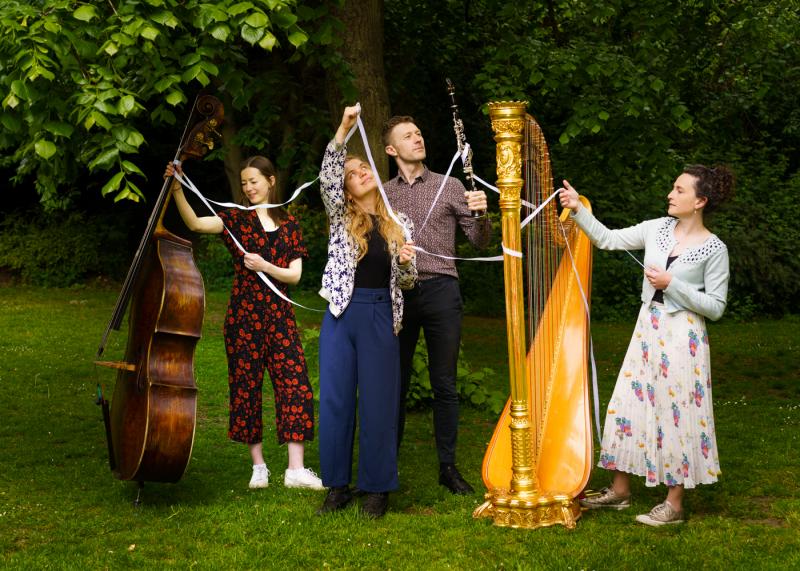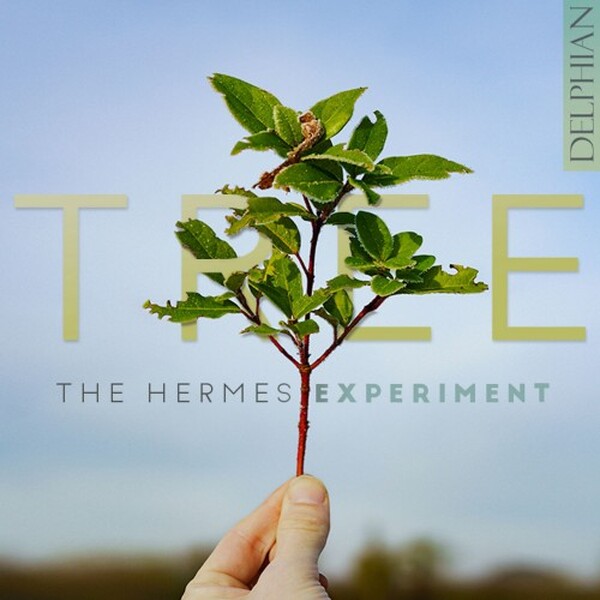First Person: clarinettist Oliver Pashley on the new horizons of The Hermes Experiment's latest album | reviews, news & interviews
First Person: clarinettist Oliver Pashley on the new horizons of The Hermes Experiment's latest album
First Person: clarinettist Oliver Pashley on the new horizons of The Hermes Experiment's latest album
Compositions by members of this unusual quartet feature for the first time

“Why the name?” and “Why the instruments?” are the two most common things we get asked about our group. As a member of The Hermes Experiment, a quartet consisting of harp, clarinet, soprano and double bass, it’s perhaps understandable that these are the two things that stoke people’s curiosity.
The combination of instruments was a stroke of chance, the collision of imagination and pragmatism. The structure of the group provides a traditional bass-chords-melody setup (albeit in an unconventional way), and we all knew each other (and each other’s playing) having recently finished studying together at university. It’s as simple as that. It was when we all moved to London for our postgraduate studies, now over 12 years ago, that we decided to form as an ensemble.
The name Hermes comes from the defender of the arts, the messenger, the being associated with transitions, the blurring of boundaries - as well as coincidentally being the name of our clunky university webmail server back in the day (so clunky in fact that it was not sufficient enough for emails to be simply deleted from said server: they had to be “expunged”, a word which always seemed far too graphic to apply to something as benign as an email and which I’ve never encountered since).
The ‘Experiment’? When we began back in 2013 we had no pre-existing repertoire for the group, and so launched ourselves into a very real experiment, working with composers our age, striking out into the world of commissioning, along with developing our group’s individual voice through improvisation, while at the same time as arranging works  already in existence (for example, songs for voice and piano) for our peculiar forces.
already in existence (for example, songs for voice and piano) for our peculiar forces.
Today, I can walk over to my bookshelf and plonk down on my table several bulging folders of music containing our commissions since we began: we now have pieces written for us from over 60 different composers, and we have arranged dozens of other works, some old and some new. Much of this music is on our albums recorded with Delphian Records, the third of which, TREE, is out this October.
The 12 years we’ve been playing together have given us the opportunity to really get to know each others’ playing (and singing) styles - both how we approach things as individuals but also how we bring that to the group.
We are constantly amazed by the new sounds that composers manage to draw out of the same four instruments, and this, together with our continued ever-changing improvisation work, has led to (we hope) a group that always manages to find something new to say, who is always searching for ways to expand the possibilities of what we do as an ensemble.
We have been lucky to work with such a huge number of marvellous composers over the years and to showcase their wonderful work, both in our live performances and our recordings. Delphian have been fantastic, giving us the space to go in any direction we felt was right. This trust is invaluable. With TREE, we wanted to continue to celebrate the music we’ve created, not just in collaboration with composers, but to reflect on our own individual strands of inspiration and how that impacts what we bring to the group.
Three of the pieces you will hear on TREE have come from an individual bringing their own original ideas to Hermes for the first time. There is an arrangement of Héloïse’s Thunder Clears, a piece she wrote in 2024 for solo voice that was premiered at Wigmore Hall and then expanded and adapted for our album; Marianne’s beautiful Islands, a meditation on digital disconnection; and my own But I Still Breathe, a short song reflecting on one’s place in the world, trying to find stillness in the madness. We are used to arranging (and recording) existing works ourselves, but this is the first time that one of our recordings will feature new, original work by members of Hermes.
In rehearsals, especially with new commissions, we are all finding our way together, discovering what the composer has given us and how to make sense of it. Having the composer rehearsing and playing alongside you feels different, but not intimidating (and that hopefully goes for my own piece too!). 
The process is still the same - we are still collectively searching for the sound and soul of the work - but there is an added intimacy and vulnerability at play, knowing that this music has come from a friend who knows you and your playing so well, and who trusts you to take their music and bring it to life.
The new album is us looking ahead to the future while also acknowledging where we’ve come from as a group. We have brand new commissions by Laura Moody, Abel Selacoe and Fergus Hall, arrangements of pieces by Nicola LeFanu, Errollyn Wallen, Hannah Peel, Cecile Chaminade and Élisabeth Jacquet de la Guerre, alongside our three own Hermes pieces. The gentle yet definite thread of nature runs throughout the album, holding together all the different strands of our work, reflecting something outwards while also hopefully giving space for reflection and contemplation.
Is it still an experiment? Certainly. We have no idea what the future holds, much in the same way we didn’t back in 2013 when we gave our first concert to a dozen people in a draughty loft space off Brick Lane. We will continue to experiment and commission and create and explore, and to celebrate the breadth and depth of musical experience both here in the UK and further afield.
Explore topics
Share this article
The future of Arts Journalism
You can stop theartsdesk.com closing!
We urgently need financing to survive. Our fundraising drive has thus far raised £49,000 but we need to reach £100,000 or we will be forced to close. Please contribute here: https://gofund.me/c3f6033d
And if you can forward this information to anyone who might assist, we’d be grateful.

Subscribe to theartsdesk.com
Thank you for continuing to read our work on theartsdesk.com. For unlimited access to every article in its entirety, including our archive of more than 15,000 pieces, we're asking for £5 per month or £40 per year. We feel it's a very good deal, and hope you do too.
To take a subscription now simply click here.
And if you're looking for that extra gift for a friend or family member, why not treat them to a theartsdesk.com gift subscription?
more Classical music
 First Person: clarinettist Oliver Pashley on the new horizons of The Hermes Experiment's latest album
Compositions by members of this unusual quartet feature for the first time
First Person: clarinettist Oliver Pashley on the new horizons of The Hermes Experiment's latest album
Compositions by members of this unusual quartet feature for the first time
 Gesualdo Passione, Les Arts Florissants, Amala Dior Company, Barbican review - inspired collaboration excavates the music's humanity
At times it was like watching an anarchic religious procession
Gesualdo Passione, Les Arts Florissants, Amala Dior Company, Barbican review - inspired collaboration excavates the music's humanity
At times it was like watching an anarchic religious procession
 Classical CDs: Camels, concrete and cabaret
An influential American composer's 90th birthday box, plus British piano concertos and a father-and-son duo
Classical CDs: Camels, concrete and cabaret
An influential American composer's 90th birthday box, plus British piano concertos and a father-and-son duo
 Cockerham, Manchester Camerata, Sheen, Martin Harris Centre, Manchester review - re-enacting the dawn of modernism
Two UK premieres added to three miniatures from a seminal event of January 1914
Cockerham, Manchester Camerata, Sheen, Martin Harris Centre, Manchester review - re-enacting the dawn of modernism
Two UK premieres added to three miniatures from a seminal event of January 1914
 Kempf, Brno Philharmonic, Davies, Bridgewater Hall, Manchester review - European tradition meets American jazz
Bouncing Czechs enjoy their Gershwin and Brubeck alongside Janáček and Dvořák
Kempf, Brno Philharmonic, Davies, Bridgewater Hall, Manchester review - European tradition meets American jazz
Bouncing Czechs enjoy their Gershwin and Brubeck alongside Janáček and Dvořák
 Solomon, OAE, Butt, QEH review - daft Biblical whitewashing with great choruses
Even a top soprano and mezzo can’t make this Handel paean wholly convincing
Solomon, OAE, Butt, QEH review - daft Biblical whitewashing with great choruses
Even a top soprano and mezzo can’t make this Handel paean wholly convincing
 Two-Piano Gala, Kings Place review - shining constellations
London Piano Festival curators and illustrious friends entertain and enlighten
Two-Piano Gala, Kings Place review - shining constellations
London Piano Festival curators and illustrious friends entertain and enlighten
 Echo Vocal Ensemble, Latto, Union Chapel review - eclectic choral programme garlanded with dance
Beautiful singing at the heart of an imaginative and stylistically varied concert
Echo Vocal Ensemble, Latto, Union Chapel review - eclectic choral programme garlanded with dance
Beautiful singing at the heart of an imaginative and stylistically varied concert
 Scott, Irish Baroque Orchestra, Whelan, RIAM, Dublin review - towards a Mozart masterpiece
Characteristic joy and enlightenment from this team, but a valveless horn brings problems
Scott, Irish Baroque Orchestra, Whelan, RIAM, Dublin review - towards a Mozart masterpiece
Characteristic joy and enlightenment from this team, but a valveless horn brings problems
 Classical CDs: Voice flutes, flugelhorns and froth
Baroque sonatas, English orchestral music and an emotionally-charged vocal recital
Classical CDs: Voice flutes, flugelhorns and froth
Baroque sonatas, English orchestral music and an emotionally-charged vocal recital
 Kanneh-Mason, Britten Sinfonia, Shave, Milton Court - a grin and a big beaming smile
A pair of striking contemporary pieces alongside two old favourites
Kanneh-Mason, Britten Sinfonia, Shave, Milton Court - a grin and a big beaming smile
A pair of striking contemporary pieces alongside two old favourites

Add comment